University Taxation Law Assignment: LAW5230, Issues and Deductions
VerifiedAdded on 2023/06/08
|22
|6271
|388
Report
AI Summary
This report is a comprehensive analysis of Australian taxation law, addressing key issues and deductions within the context of a given scenario. Part A focuses on the residency status of individuals (John and Jenny), the taxability of their income from various sources (salary, dividends, and sale of land), and the application of relevant tax laws (ITAA 1997, ITAA 1936). It explores the concepts of assessable income, CGT, and the implications of different residency tests. Part B delves into the deduction regimes in Australia, examining work-related expenses and other tax-deductible items. It discusses the concerns related to current arrangements, compliance burdens, and the deduction levels, comparing the Australian system with that of New Zealand. The report references relevant case law and legislation to support its analysis, providing a detailed understanding of tax principles and their practical application.
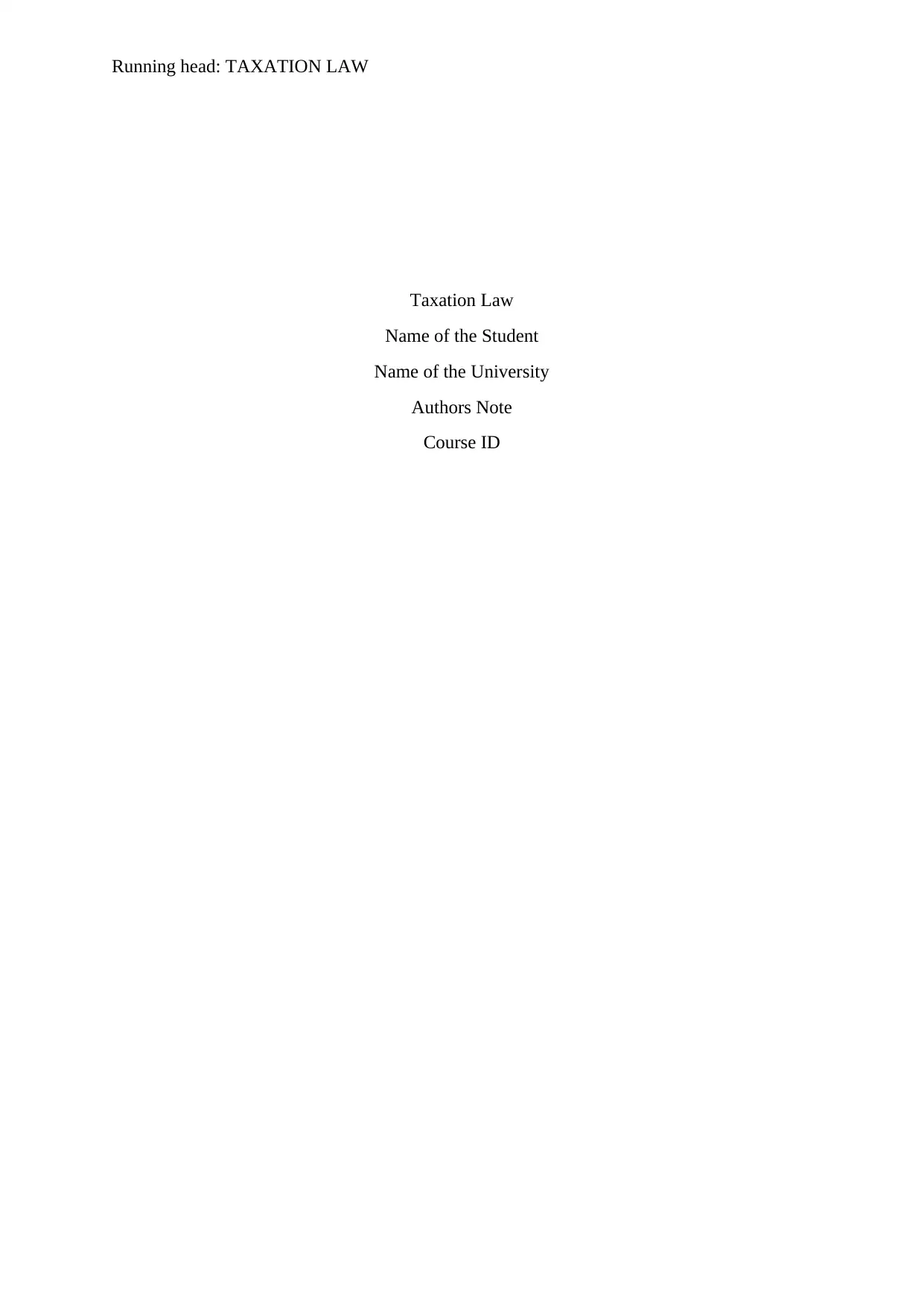
Running head: TAXATION LAW
Taxation Law
Name of the Student
Name of the University
Authors Note
Course ID
Taxation Law
Name of the Student
Name of the University
Authors Note
Course ID
Paraphrase This Document
Need a fresh take? Get an instant paraphrase of this document with our AI Paraphraser
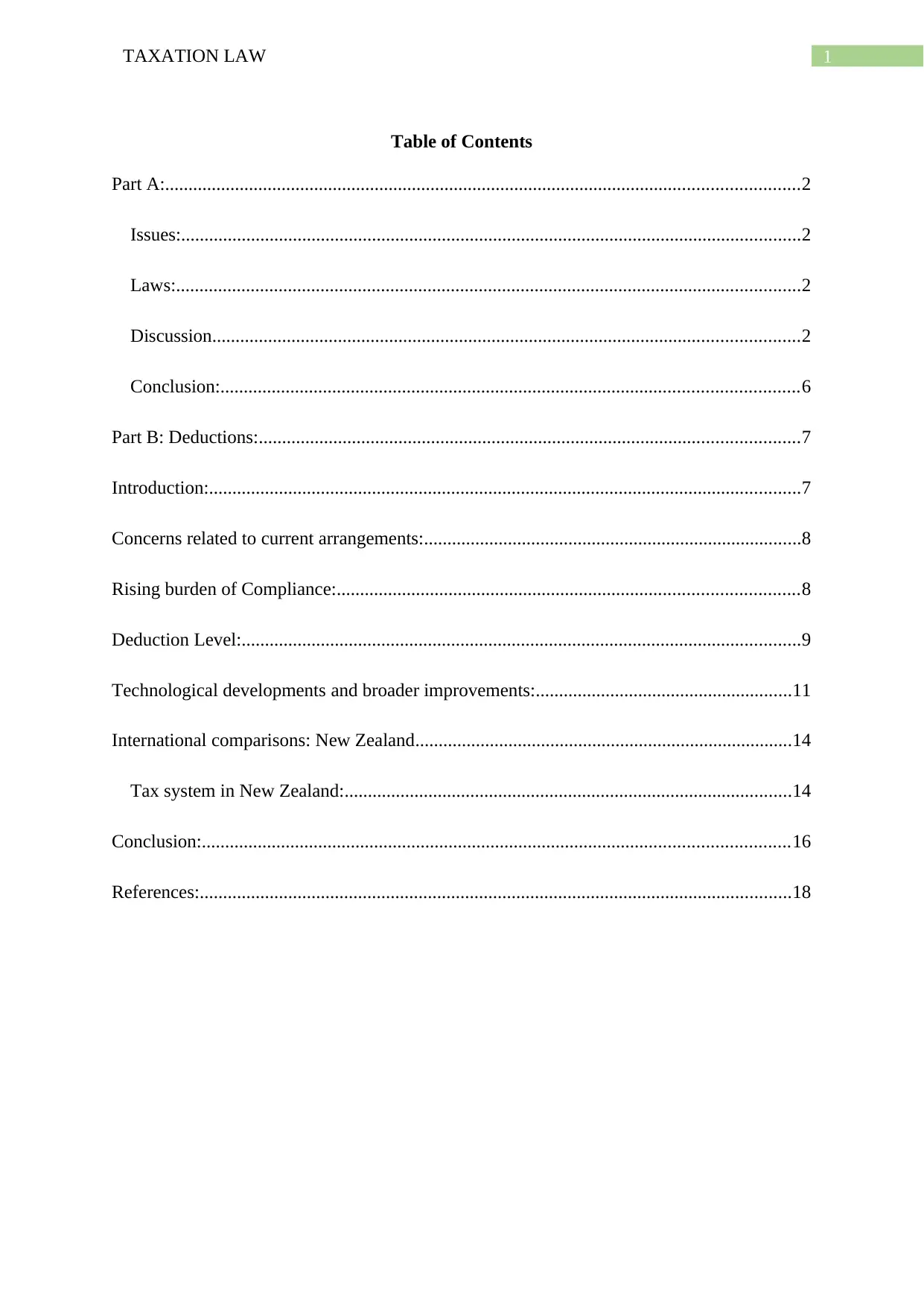
1TAXATION LAW
Table of Contents
Part A:........................................................................................................................................2
Issues:.....................................................................................................................................2
Laws:......................................................................................................................................2
Discussion..............................................................................................................................2
Conclusion:............................................................................................................................6
Part B: Deductions:....................................................................................................................7
Introduction:...............................................................................................................................7
Concerns related to current arrangements:.................................................................................8
Rising burden of Compliance:...................................................................................................8
Deduction Level:........................................................................................................................9
Technological developments and broader improvements:.......................................................11
International comparisons: New Zealand.................................................................................14
Tax system in New Zealand:................................................................................................14
Conclusion:..............................................................................................................................16
References:...............................................................................................................................18
Table of Contents
Part A:........................................................................................................................................2
Issues:.....................................................................................................................................2
Laws:......................................................................................................................................2
Discussion..............................................................................................................................2
Conclusion:............................................................................................................................6
Part B: Deductions:....................................................................................................................7
Introduction:...............................................................................................................................7
Concerns related to current arrangements:.................................................................................8
Rising burden of Compliance:...................................................................................................8
Deduction Level:........................................................................................................................9
Technological developments and broader improvements:.......................................................11
International comparisons: New Zealand.................................................................................14
Tax system in New Zealand:................................................................................................14
Conclusion:..............................................................................................................................16
References:...............................................................................................................................18
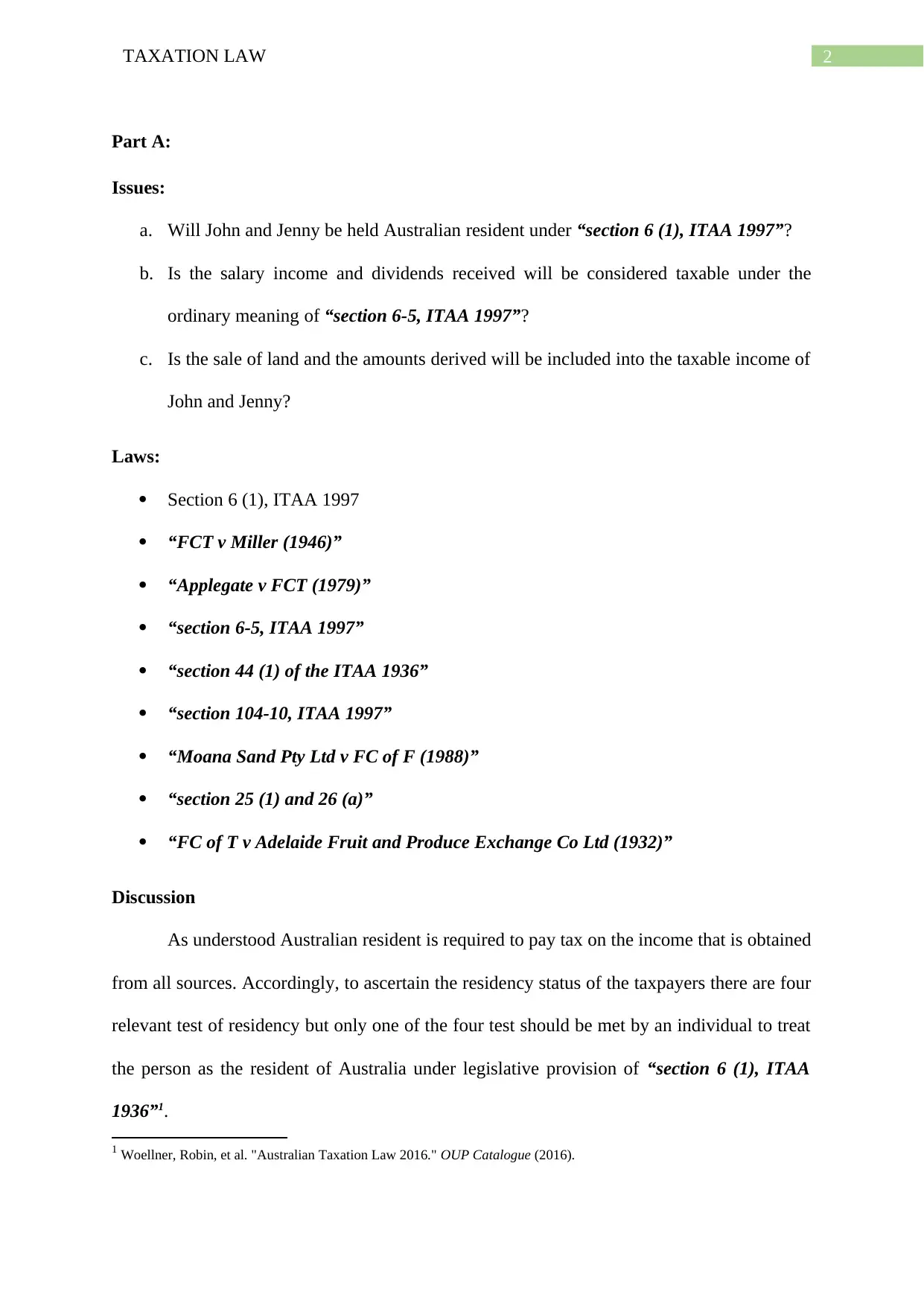
2TAXATION LAW
Part A:
Issues:
a. Will John and Jenny be held Australian resident under “section 6 (1), ITAA 1997”?
b. Is the salary income and dividends received will be considered taxable under the
ordinary meaning of “section 6-5, ITAA 1997”?
c. Is the sale of land and the amounts derived will be included into the taxable income of
John and Jenny?
Laws:
Section 6 (1), ITAA 1997
“FCT v Miller (1946)”
“Applegate v FCT (1979)”
“section 6-5, ITAA 1997”
“section 44 (1) of the ITAA 1936”
“section 104-10, ITAA 1997”
“Moana Sand Pty Ltd v FC of F (1988)”
“section 25 (1) and 26 (a)”
“FC of T v Adelaide Fruit and Produce Exchange Co Ltd (1932)”
Discussion
As understood Australian resident is required to pay tax on the income that is obtained
from all sources. Accordingly, to ascertain the residency status of the taxpayers there are four
relevant test of residency but only one of the four test should be met by an individual to treat
the person as the resident of Australia under legislative provision of “section 6 (1), ITAA
1936”1.
1 Woellner, Robin, et al. "Australian Taxation Law 2016." OUP Catalogue (2016).
Part A:
Issues:
a. Will John and Jenny be held Australian resident under “section 6 (1), ITAA 1997”?
b. Is the salary income and dividends received will be considered taxable under the
ordinary meaning of “section 6-5, ITAA 1997”?
c. Is the sale of land and the amounts derived will be included into the taxable income of
John and Jenny?
Laws:
Section 6 (1), ITAA 1997
“FCT v Miller (1946)”
“Applegate v FCT (1979)”
“section 6-5, ITAA 1997”
“section 44 (1) of the ITAA 1936”
“section 104-10, ITAA 1997”
“Moana Sand Pty Ltd v FC of F (1988)”
“section 25 (1) and 26 (a)”
“FC of T v Adelaide Fruit and Produce Exchange Co Ltd (1932)”
Discussion
As understood Australian resident is required to pay tax on the income that is obtained
from all sources. Accordingly, to ascertain the residency status of the taxpayers there are four
relevant test of residency but only one of the four test should be met by an individual to treat
the person as the resident of Australia under legislative provision of “section 6 (1), ITAA
1936”1.
1 Woellner, Robin, et al. "Australian Taxation Law 2016." OUP Catalogue (2016).
⊘ This is a preview!⊘
Do you want full access?
Subscribe today to unlock all pages.

Trusted by 1+ million students worldwide
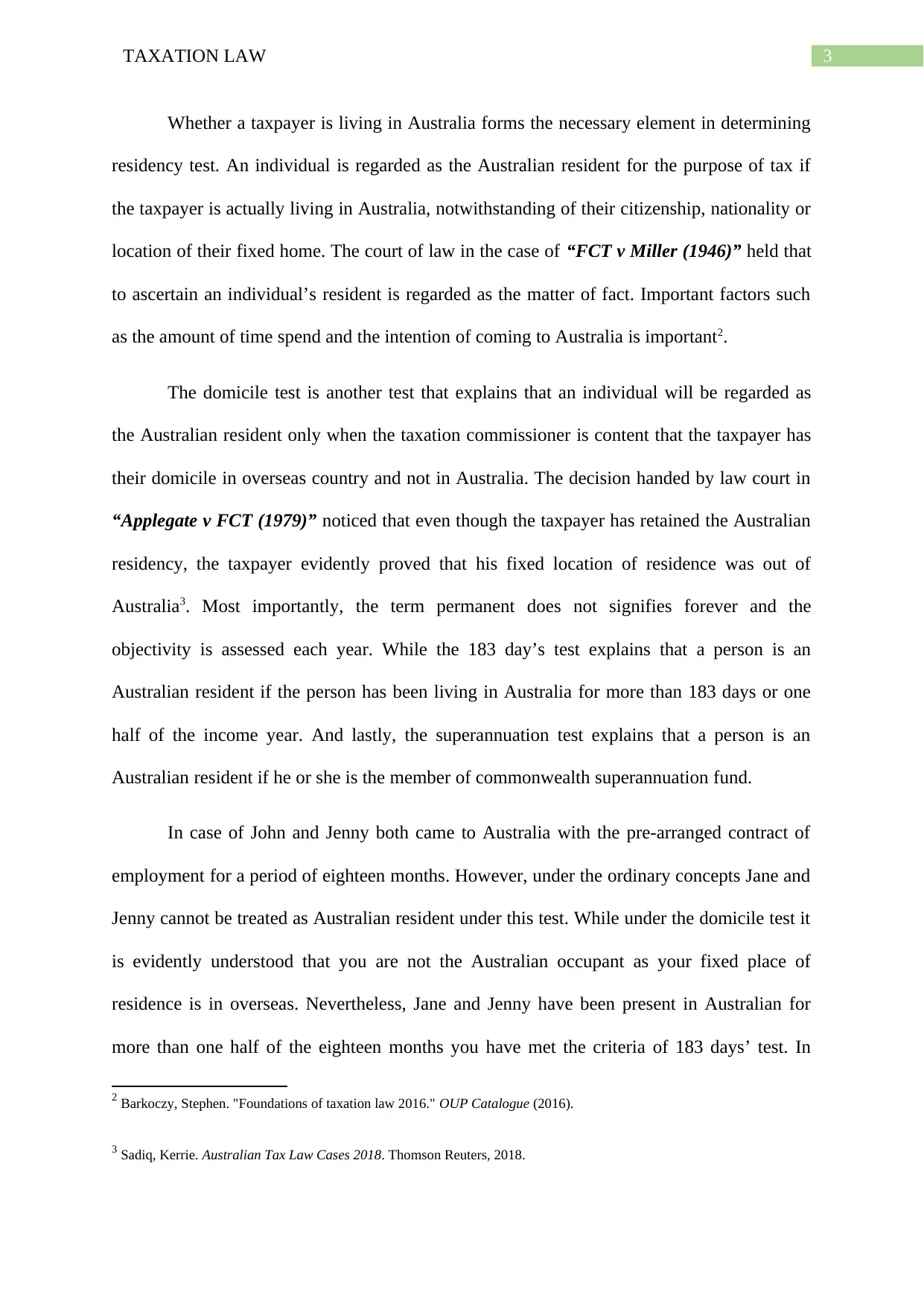
3TAXATION LAW
Whether a taxpayer is living in Australia forms the necessary element in determining
residency test. An individual is regarded as the Australian resident for the purpose of tax if
the taxpayer is actually living in Australia, notwithstanding of their citizenship, nationality or
location of their fixed home. The court of law in the case of “FCT v Miller (1946)” held that
to ascertain an individual’s resident is regarded as the matter of fact. Important factors such
as the amount of time spend and the intention of coming to Australia is important2.
The domicile test is another test that explains that an individual will be regarded as
the Australian resident only when the taxation commissioner is content that the taxpayer has
their domicile in overseas country and not in Australia. The decision handed by law court in
“Applegate v FCT (1979)” noticed that even though the taxpayer has retained the Australian
residency, the taxpayer evidently proved that his fixed location of residence was out of
Australia3. Most importantly, the term permanent does not signifies forever and the
objectivity is assessed each year. While the 183 day’s test explains that a person is an
Australian resident if the person has been living in Australia for more than 183 days or one
half of the income year. And lastly, the superannuation test explains that a person is an
Australian resident if he or she is the member of commonwealth superannuation fund.
In case of John and Jenny both came to Australia with the pre-arranged contract of
employment for a period of eighteen months. However, under the ordinary concepts Jane and
Jenny cannot be treated as Australian resident under this test. While under the domicile test it
is evidently understood that you are not the Australian occupant as your fixed place of
residence is in overseas. Nevertheless, Jane and Jenny have been present in Australian for
more than one half of the eighteen months you have met the criteria of 183 days’ test. In
2 Barkoczy, Stephen. "Foundations of taxation law 2016." OUP Catalogue (2016).
3 Sadiq, Kerrie. Australian Tax Law Cases 2018. Thomson Reuters, 2018.
Whether a taxpayer is living in Australia forms the necessary element in determining
residency test. An individual is regarded as the Australian resident for the purpose of tax if
the taxpayer is actually living in Australia, notwithstanding of their citizenship, nationality or
location of their fixed home. The court of law in the case of “FCT v Miller (1946)” held that
to ascertain an individual’s resident is regarded as the matter of fact. Important factors such
as the amount of time spend and the intention of coming to Australia is important2.
The domicile test is another test that explains that an individual will be regarded as
the Australian resident only when the taxation commissioner is content that the taxpayer has
their domicile in overseas country and not in Australia. The decision handed by law court in
“Applegate v FCT (1979)” noticed that even though the taxpayer has retained the Australian
residency, the taxpayer evidently proved that his fixed location of residence was out of
Australia3. Most importantly, the term permanent does not signifies forever and the
objectivity is assessed each year. While the 183 day’s test explains that a person is an
Australian resident if the person has been living in Australia for more than 183 days or one
half of the income year. And lastly, the superannuation test explains that a person is an
Australian resident if he or she is the member of commonwealth superannuation fund.
In case of John and Jenny both came to Australia with the pre-arranged contract of
employment for a period of eighteen months. However, under the ordinary concepts Jane and
Jenny cannot be treated as Australian resident under this test. While under the domicile test it
is evidently understood that you are not the Australian occupant as your fixed place of
residence is in overseas. Nevertheless, Jane and Jenny have been present in Australian for
more than one half of the eighteen months you have met the criteria of 183 days’ test. In
2 Barkoczy, Stephen. "Foundations of taxation law 2016." OUP Catalogue (2016).
3 Sadiq, Kerrie. Australian Tax Law Cases 2018. Thomson Reuters, 2018.
Paraphrase This Document
Need a fresh take? Get an instant paraphrase of this document with our AI Paraphraser
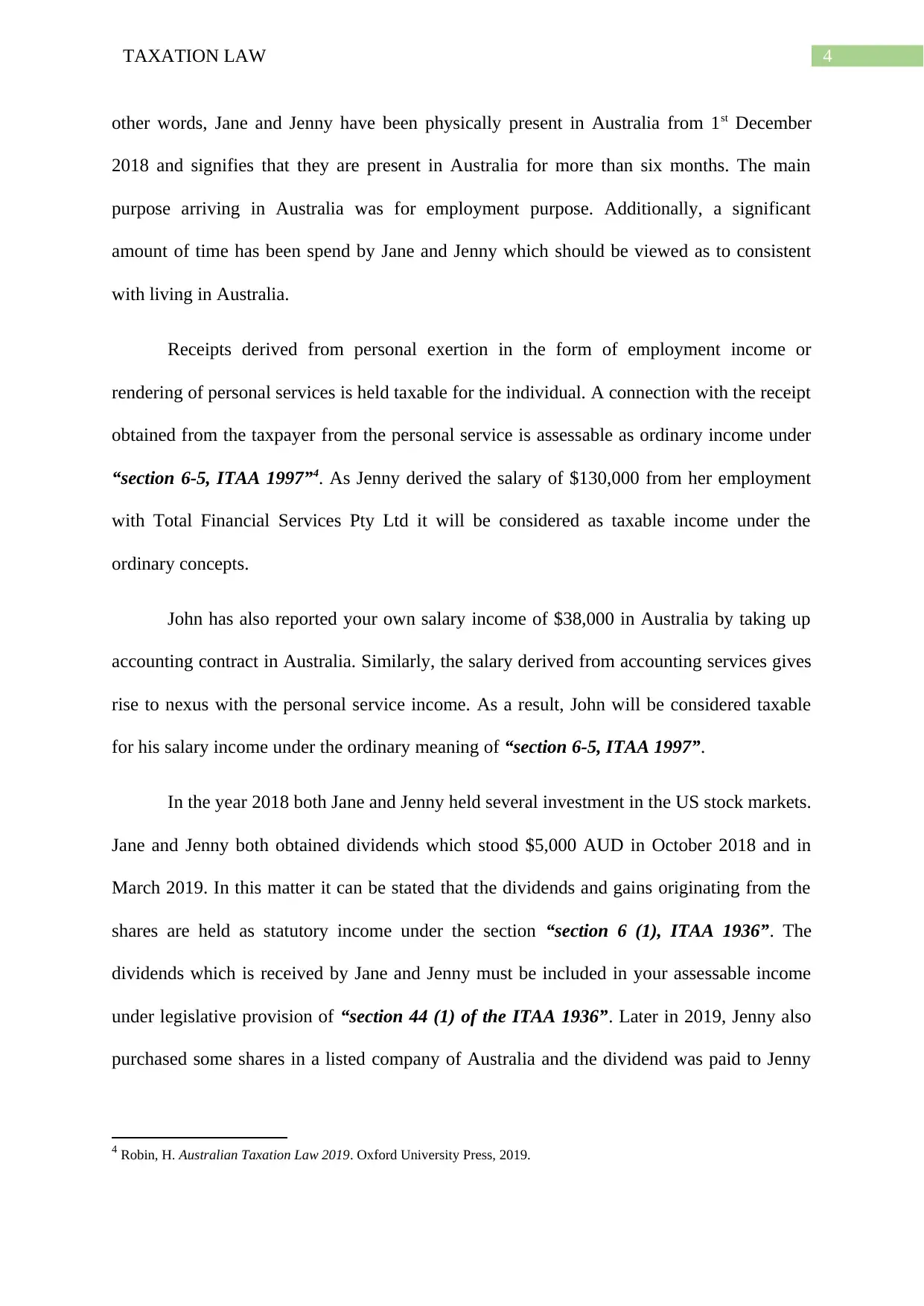
4TAXATION LAW
other words, Jane and Jenny have been physically present in Australia from 1st December
2018 and signifies that they are present in Australia for more than six months. The main
purpose arriving in Australia was for employment purpose. Additionally, a significant
amount of time has been spend by Jane and Jenny which should be viewed as to consistent
with living in Australia.
Receipts derived from personal exertion in the form of employment income or
rendering of personal services is held taxable for the individual. A connection with the receipt
obtained from the taxpayer from the personal service is assessable as ordinary income under
“section 6-5, ITAA 1997”4. As Jenny derived the salary of $130,000 from her employment
with Total Financial Services Pty Ltd it will be considered as taxable income under the
ordinary concepts.
John has also reported your own salary income of $38,000 in Australia by taking up
accounting contract in Australia. Similarly, the salary derived from accounting services gives
rise to nexus with the personal service income. As a result, John will be considered taxable
for his salary income under the ordinary meaning of “section 6-5, ITAA 1997”.
In the year 2018 both Jane and Jenny held several investment in the US stock markets.
Jane and Jenny both obtained dividends which stood $5,000 AUD in October 2018 and in
March 2019. In this matter it can be stated that the dividends and gains originating from the
shares are held as statutory income under the section “section 6 (1), ITAA 1936”. The
dividends which is received by Jane and Jenny must be included in your assessable income
under legislative provision of “section 44 (1) of the ITAA 1936”. Later in 2019, Jenny also
purchased some shares in a listed company of Australia and the dividend was paid to Jenny
4 Robin, H. Australian Taxation Law 2019. Oxford University Press, 2019.
other words, Jane and Jenny have been physically present in Australia from 1st December
2018 and signifies that they are present in Australia for more than six months. The main
purpose arriving in Australia was for employment purpose. Additionally, a significant
amount of time has been spend by Jane and Jenny which should be viewed as to consistent
with living in Australia.
Receipts derived from personal exertion in the form of employment income or
rendering of personal services is held taxable for the individual. A connection with the receipt
obtained from the taxpayer from the personal service is assessable as ordinary income under
“section 6-5, ITAA 1997”4. As Jenny derived the salary of $130,000 from her employment
with Total Financial Services Pty Ltd it will be considered as taxable income under the
ordinary concepts.
John has also reported your own salary income of $38,000 in Australia by taking up
accounting contract in Australia. Similarly, the salary derived from accounting services gives
rise to nexus with the personal service income. As a result, John will be considered taxable
for his salary income under the ordinary meaning of “section 6-5, ITAA 1997”.
In the year 2018 both Jane and Jenny held several investment in the US stock markets.
Jane and Jenny both obtained dividends which stood $5,000 AUD in October 2018 and in
March 2019. In this matter it can be stated that the dividends and gains originating from the
shares are held as statutory income under the section “section 6 (1), ITAA 1936”. The
dividends which is received by Jane and Jenny must be included in your assessable income
under legislative provision of “section 44 (1) of the ITAA 1936”. Later in 2019, Jenny also
purchased some shares in a listed company of Australia and the dividend was paid to Jenny
4 Robin, H. Australian Taxation Law 2019. Oxford University Press, 2019.
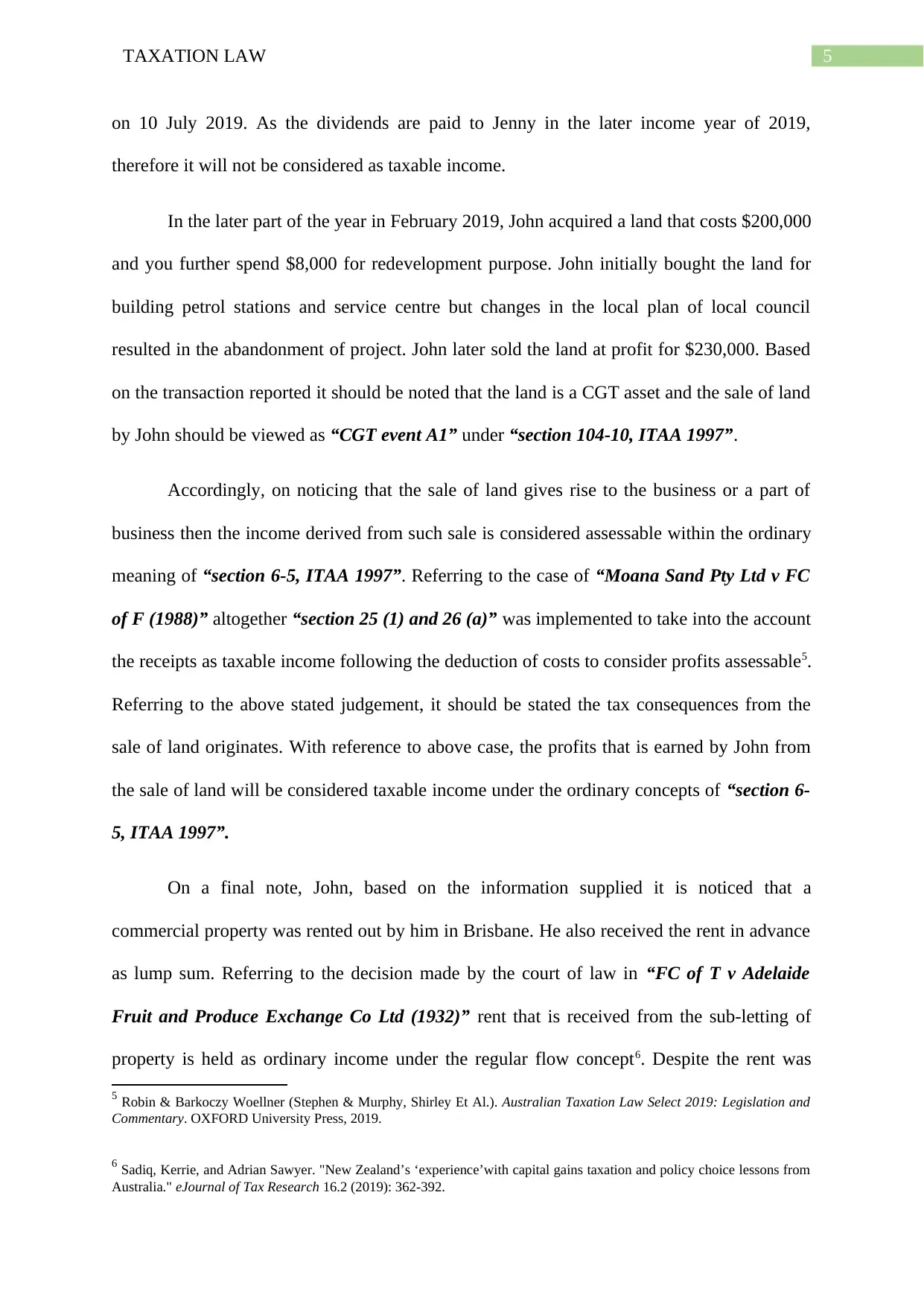
5TAXATION LAW
on 10 July 2019. As the dividends are paid to Jenny in the later income year of 2019,
therefore it will not be considered as taxable income.
In the later part of the year in February 2019, John acquired a land that costs $200,000
and you further spend $8,000 for redevelopment purpose. John initially bought the land for
building petrol stations and service centre but changes in the local plan of local council
resulted in the abandonment of project. John later sold the land at profit for $230,000. Based
on the transaction reported it should be noted that the land is a CGT asset and the sale of land
by John should be viewed as “CGT event A1” under “section 104-10, ITAA 1997”.
Accordingly, on noticing that the sale of land gives rise to the business or a part of
business then the income derived from such sale is considered assessable within the ordinary
meaning of “section 6-5, ITAA 1997”. Referring to the case of “Moana Sand Pty Ltd v FC
of F (1988)” altogether “section 25 (1) and 26 (a)” was implemented to take into the account
the receipts as taxable income following the deduction of costs to consider profits assessable5.
Referring to the above stated judgement, it should be stated the tax consequences from the
sale of land originates. With reference to above case, the profits that is earned by John from
the sale of land will be considered taxable income under the ordinary concepts of “section 6-
5, ITAA 1997”.
On a final note, John, based on the information supplied it is noticed that a
commercial property was rented out by him in Brisbane. He also received the rent in advance
as lump sum. Referring to the decision made by the court of law in “FC of T v Adelaide
Fruit and Produce Exchange Co Ltd (1932)” rent that is received from the sub-letting of
property is held as ordinary income under the regular flow concept6. Despite the rent was
5 Robin & Barkoczy Woellner (Stephen & Murphy, Shirley Et Al.). Australian Taxation Law Select 2019: Legislation and
Commentary. OXFORD University Press, 2019.
6 Sadiq, Kerrie, and Adrian Sawyer. "New Zealand’s ‘experience’with capital gains taxation and policy choice lessons from
Australia." eJournal of Tax Research 16.2 (2019): 362-392.
on 10 July 2019. As the dividends are paid to Jenny in the later income year of 2019,
therefore it will not be considered as taxable income.
In the later part of the year in February 2019, John acquired a land that costs $200,000
and you further spend $8,000 for redevelopment purpose. John initially bought the land for
building petrol stations and service centre but changes in the local plan of local council
resulted in the abandonment of project. John later sold the land at profit for $230,000. Based
on the transaction reported it should be noted that the land is a CGT asset and the sale of land
by John should be viewed as “CGT event A1” under “section 104-10, ITAA 1997”.
Accordingly, on noticing that the sale of land gives rise to the business or a part of
business then the income derived from such sale is considered assessable within the ordinary
meaning of “section 6-5, ITAA 1997”. Referring to the case of “Moana Sand Pty Ltd v FC
of F (1988)” altogether “section 25 (1) and 26 (a)” was implemented to take into the account
the receipts as taxable income following the deduction of costs to consider profits assessable5.
Referring to the above stated judgement, it should be stated the tax consequences from the
sale of land originates. With reference to above case, the profits that is earned by John from
the sale of land will be considered taxable income under the ordinary concepts of “section 6-
5, ITAA 1997”.
On a final note, John, based on the information supplied it is noticed that a
commercial property was rented out by him in Brisbane. He also received the rent in advance
as lump sum. Referring to the decision made by the court of law in “FC of T v Adelaide
Fruit and Produce Exchange Co Ltd (1932)” rent that is received from the sub-letting of
property is held as ordinary income under the regular flow concept6. Despite the rent was
5 Robin & Barkoczy Woellner (Stephen & Murphy, Shirley Et Al.). Australian Taxation Law Select 2019: Legislation and
Commentary. OXFORD University Press, 2019.
6 Sadiq, Kerrie, and Adrian Sawyer. "New Zealand’s ‘experience’with capital gains taxation and policy choice lessons from
Australia." eJournal of Tax Research 16.2 (2019): 362-392.
⊘ This is a preview!⊘
Do you want full access?
Subscribe today to unlock all pages.

Trusted by 1+ million students worldwide
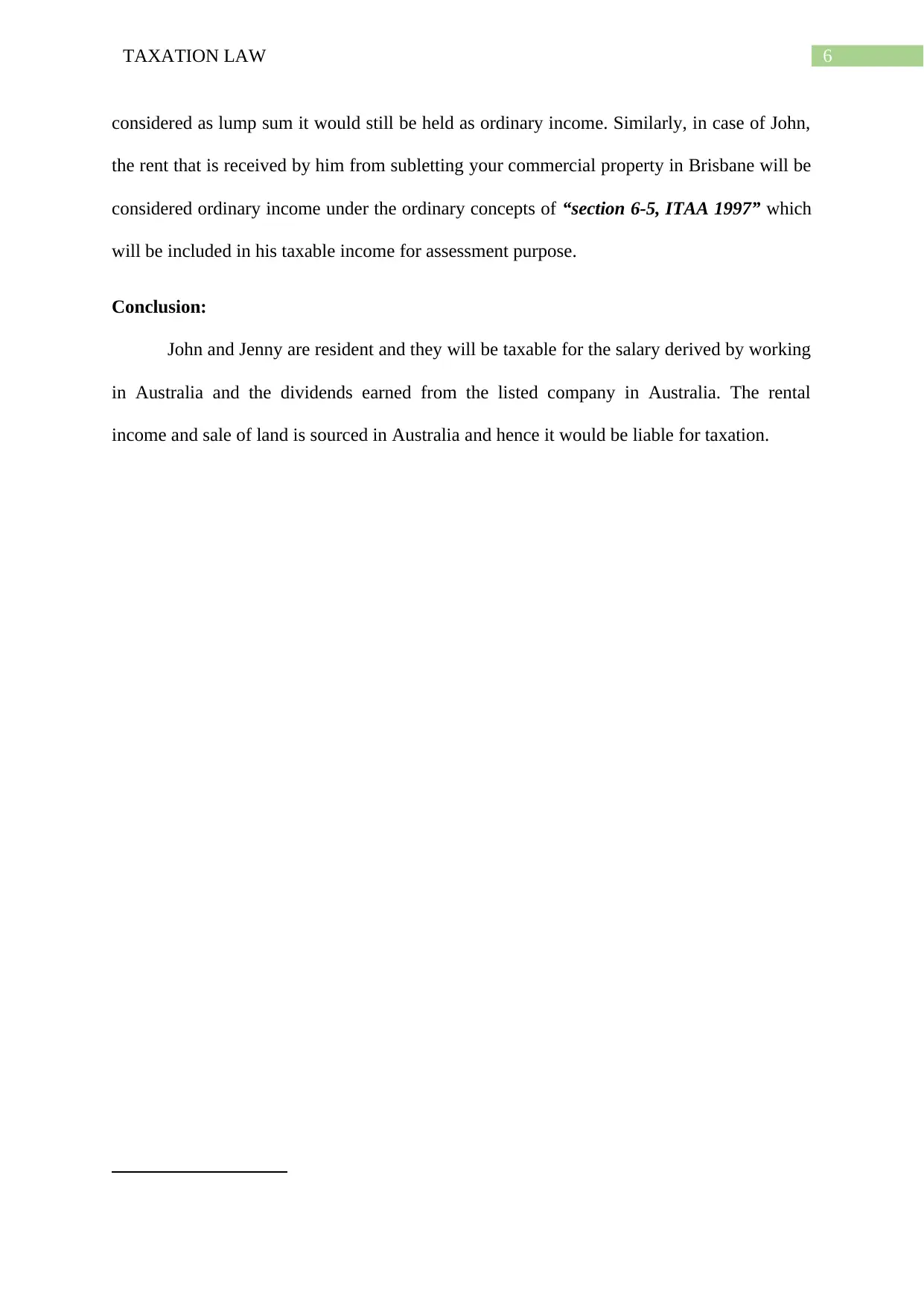
6TAXATION LAW
considered as lump sum it would still be held as ordinary income. Similarly, in case of John,
the rent that is received by him from subletting your commercial property in Brisbane will be
considered ordinary income under the ordinary concepts of “section 6-5, ITAA 1997” which
will be included in his taxable income for assessment purpose.
Conclusion:
John and Jenny are resident and they will be taxable for the salary derived by working
in Australia and the dividends earned from the listed company in Australia. The rental
income and sale of land is sourced in Australia and hence it would be liable for taxation.
considered as lump sum it would still be held as ordinary income. Similarly, in case of John,
the rent that is received by him from subletting your commercial property in Brisbane will be
considered ordinary income under the ordinary concepts of “section 6-5, ITAA 1997” which
will be included in his taxable income for assessment purpose.
Conclusion:
John and Jenny are resident and they will be taxable for the salary derived by working
in Australia and the dividends earned from the listed company in Australia. The rental
income and sale of land is sourced in Australia and hence it would be liable for taxation.
Paraphrase This Document
Need a fresh take? Get an instant paraphrase of this document with our AI Paraphraser
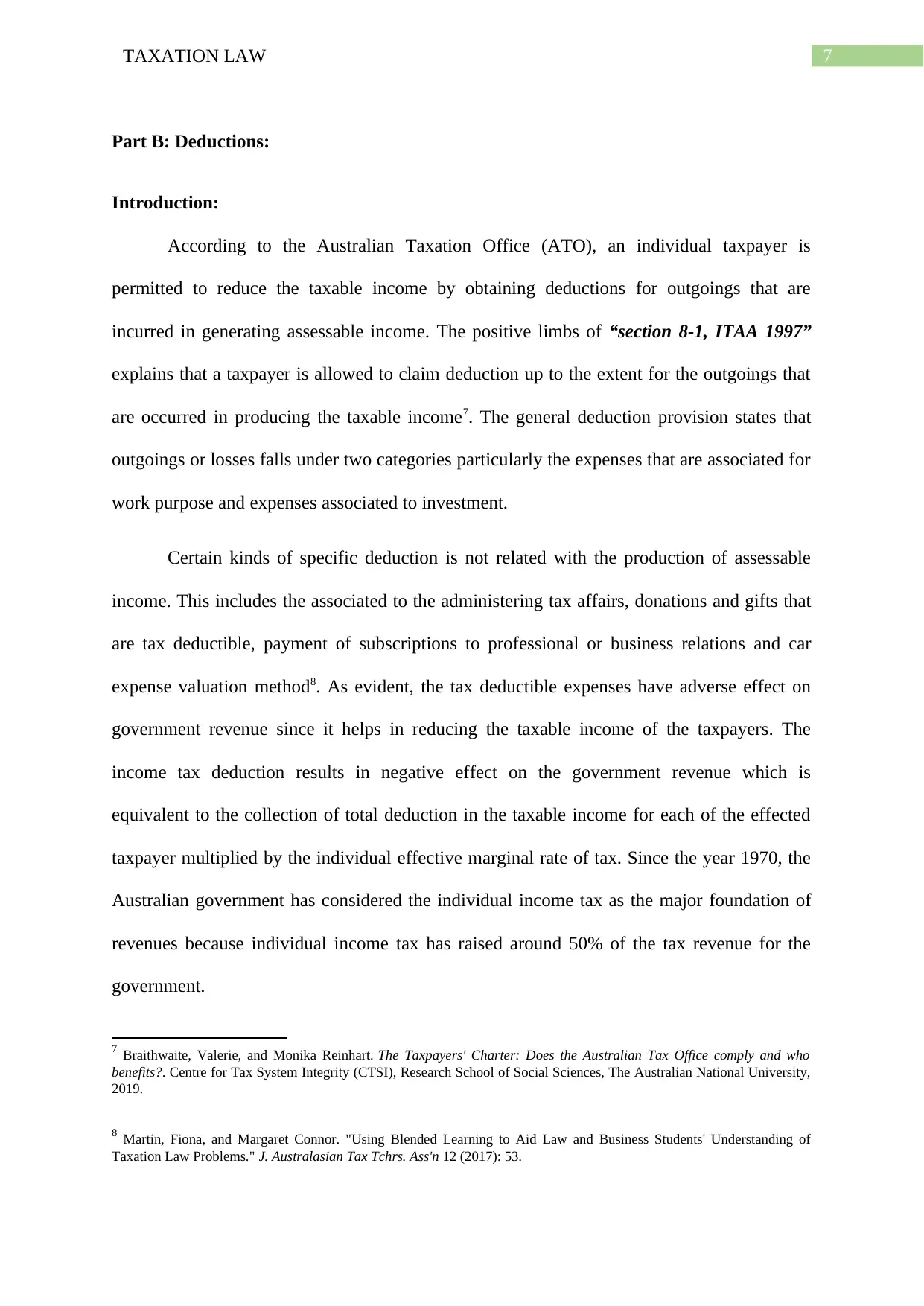
7TAXATION LAW
Part B: Deductions:
Introduction:
According to the Australian Taxation Office (ATO), an individual taxpayer is
permitted to reduce the taxable income by obtaining deductions for outgoings that are
incurred in generating assessable income. The positive limbs of “section 8-1, ITAA 1997”
explains that a taxpayer is allowed to claim deduction up to the extent for the outgoings that
are occurred in producing the taxable income7. The general deduction provision states that
outgoings or losses falls under two categories particularly the expenses that are associated for
work purpose and expenses associated to investment.
Certain kinds of specific deduction is not related with the production of assessable
income. This includes the associated to the administering tax affairs, donations and gifts that
are tax deductible, payment of subscriptions to professional or business relations and car
expense valuation method8. As evident, the tax deductible expenses have adverse effect on
government revenue since it helps in reducing the taxable income of the taxpayers. The
income tax deduction results in negative effect on the government revenue which is
equivalent to the collection of total deduction in the taxable income for each of the effected
taxpayer multiplied by the individual effective marginal rate of tax. Since the year 1970, the
Australian government has considered the individual income tax as the major foundation of
revenues because individual income tax has raised around 50% of the tax revenue for the
government.
7 Braithwaite, Valerie, and Monika Reinhart. The Taxpayers' Charter: Does the Australian Tax Office comply and who
benefits?. Centre for Tax System Integrity (CTSI), Research School of Social Sciences, The Australian National University,
2019.
8 Martin, Fiona, and Margaret Connor. "Using Blended Learning to Aid Law and Business Students' Understanding of
Taxation Law Problems." J. Australasian Tax Tchrs. Ass'n 12 (2017): 53.
Part B: Deductions:
Introduction:
According to the Australian Taxation Office (ATO), an individual taxpayer is
permitted to reduce the taxable income by obtaining deductions for outgoings that are
incurred in generating assessable income. The positive limbs of “section 8-1, ITAA 1997”
explains that a taxpayer is allowed to claim deduction up to the extent for the outgoings that
are occurred in producing the taxable income7. The general deduction provision states that
outgoings or losses falls under two categories particularly the expenses that are associated for
work purpose and expenses associated to investment.
Certain kinds of specific deduction is not related with the production of assessable
income. This includes the associated to the administering tax affairs, donations and gifts that
are tax deductible, payment of subscriptions to professional or business relations and car
expense valuation method8. As evident, the tax deductible expenses have adverse effect on
government revenue since it helps in reducing the taxable income of the taxpayers. The
income tax deduction results in negative effect on the government revenue which is
equivalent to the collection of total deduction in the taxable income for each of the effected
taxpayer multiplied by the individual effective marginal rate of tax. Since the year 1970, the
Australian government has considered the individual income tax as the major foundation of
revenues because individual income tax has raised around 50% of the tax revenue for the
government.
7 Braithwaite, Valerie, and Monika Reinhart. The Taxpayers' Charter: Does the Australian Tax Office comply and who
benefits?. Centre for Tax System Integrity (CTSI), Research School of Social Sciences, The Australian National University,
2019.
8 Martin, Fiona, and Margaret Connor. "Using Blended Learning to Aid Law and Business Students' Understanding of
Taxation Law Problems." J. Australasian Tax Tchrs. Ass'n 12 (2017): 53.
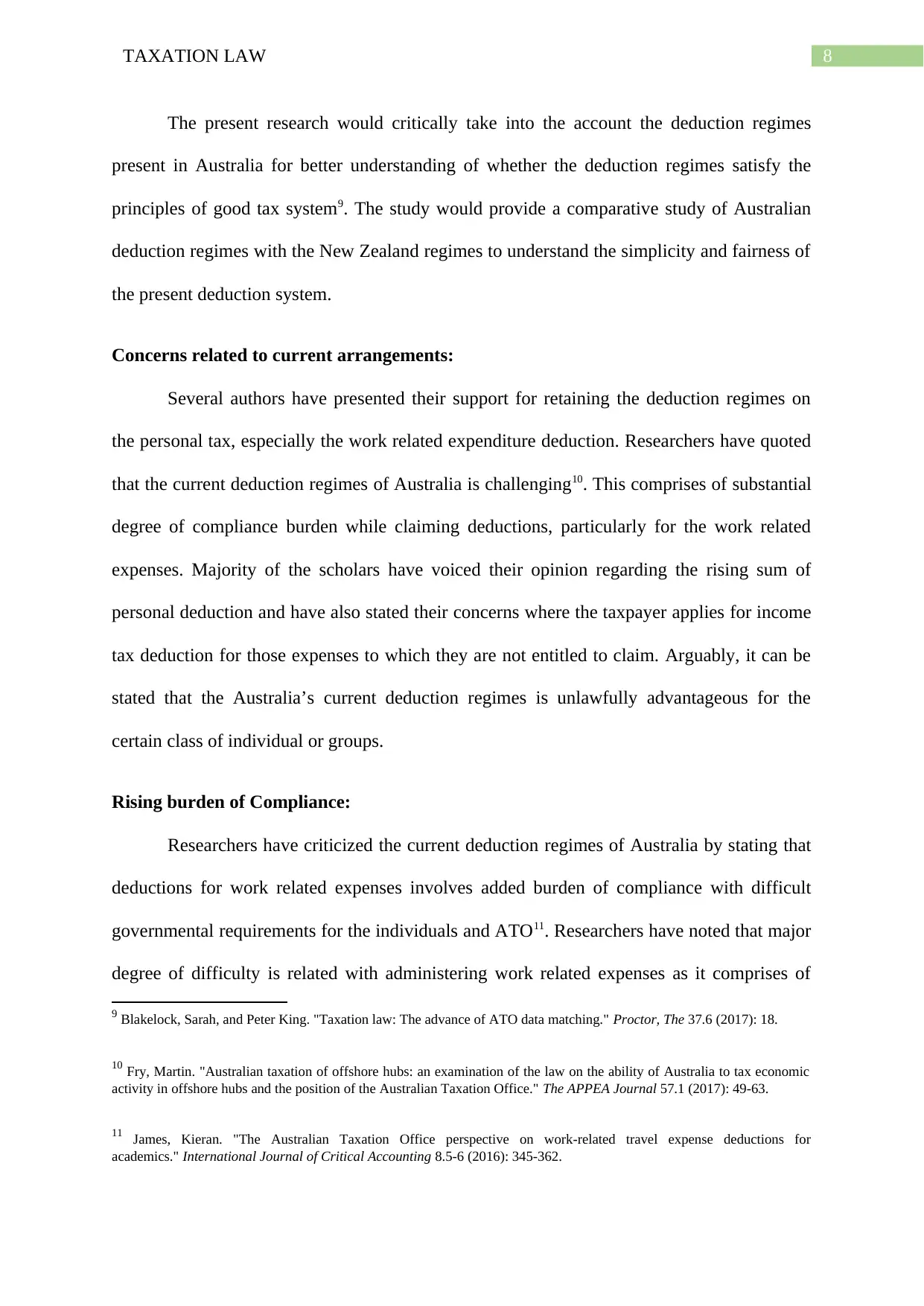
8TAXATION LAW
The present research would critically take into the account the deduction regimes
present in Australia for better understanding of whether the deduction regimes satisfy the
principles of good tax system9. The study would provide a comparative study of Australian
deduction regimes with the New Zealand regimes to understand the simplicity and fairness of
the present deduction system.
Concerns related to current arrangements:
Several authors have presented their support for retaining the deduction regimes on
the personal tax, especially the work related expenditure deduction. Researchers have quoted
that the current deduction regimes of Australia is challenging10. This comprises of substantial
degree of compliance burden while claiming deductions, particularly for the work related
expenses. Majority of the scholars have voiced their opinion regarding the rising sum of
personal deduction and have also stated their concerns where the taxpayer applies for income
tax deduction for those expenses to which they are not entitled to claim. Arguably, it can be
stated that the Australia’s current deduction regimes is unlawfully advantageous for the
certain class of individual or groups.
Rising burden of Compliance:
Researchers have criticized the current deduction regimes of Australia by stating that
deductions for work related expenses involves added burden of compliance with difficult
governmental requirements for the individuals and ATO11. Researchers have noted that major
degree of difficulty is related with administering work related expenses as it comprises of
9 Blakelock, Sarah, and Peter King. "Taxation law: The advance of ATO data matching." Proctor, The 37.6 (2017): 18.
10 Fry, Martin. "Australian taxation of offshore hubs: an examination of the law on the ability of Australia to tax economic
activity in offshore hubs and the position of the Australian Taxation Office." The APPEA Journal 57.1 (2017): 49-63.
11 James, Kieran. "The Australian Taxation Office perspective on work-related travel expense deductions for
academics." International Journal of Critical Accounting 8.5-6 (2016): 345-362.
The present research would critically take into the account the deduction regimes
present in Australia for better understanding of whether the deduction regimes satisfy the
principles of good tax system9. The study would provide a comparative study of Australian
deduction regimes with the New Zealand regimes to understand the simplicity and fairness of
the present deduction system.
Concerns related to current arrangements:
Several authors have presented their support for retaining the deduction regimes on
the personal tax, especially the work related expenditure deduction. Researchers have quoted
that the current deduction regimes of Australia is challenging10. This comprises of substantial
degree of compliance burden while claiming deductions, particularly for the work related
expenses. Majority of the scholars have voiced their opinion regarding the rising sum of
personal deduction and have also stated their concerns where the taxpayer applies for income
tax deduction for those expenses to which they are not entitled to claim. Arguably, it can be
stated that the Australia’s current deduction regimes is unlawfully advantageous for the
certain class of individual or groups.
Rising burden of Compliance:
Researchers have criticized the current deduction regimes of Australia by stating that
deductions for work related expenses involves added burden of compliance with difficult
governmental requirements for the individuals and ATO11. Researchers have noted that major
degree of difficulty is related with administering work related expenses as it comprises of
9 Blakelock, Sarah, and Peter King. "Taxation law: The advance of ATO data matching." Proctor, The 37.6 (2017): 18.
10 Fry, Martin. "Australian taxation of offshore hubs: an examination of the law on the ability of Australia to tax economic
activity in offshore hubs and the position of the Australian Taxation Office." The APPEA Journal 57.1 (2017): 49-63.
11 James, Kieran. "The Australian Taxation Office perspective on work-related travel expense deductions for
academics." International Journal of Critical Accounting 8.5-6 (2016): 345-362.
⊘ This is a preview!⊘
Do you want full access?
Subscribe today to unlock all pages.

Trusted by 1+ million students worldwide
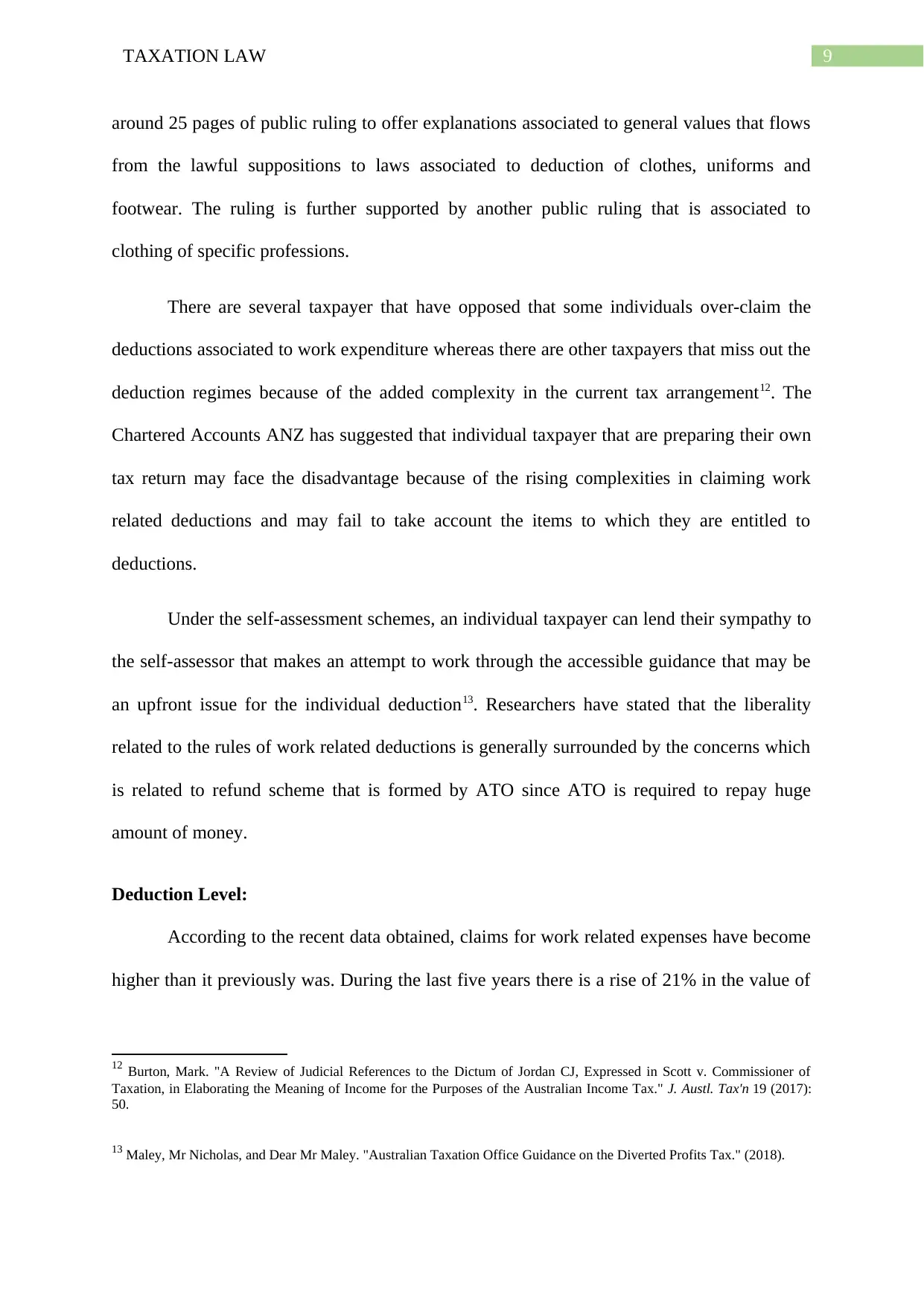
9TAXATION LAW
around 25 pages of public ruling to offer explanations associated to general values that flows
from the lawful suppositions to laws associated to deduction of clothes, uniforms and
footwear. The ruling is further supported by another public ruling that is associated to
clothing of specific professions.
There are several taxpayer that have opposed that some individuals over-claim the
deductions associated to work expenditure whereas there are other taxpayers that miss out the
deduction regimes because of the added complexity in the current tax arrangement12. The
Chartered Accounts ANZ has suggested that individual taxpayer that are preparing their own
tax return may face the disadvantage because of the rising complexities in claiming work
related deductions and may fail to take account the items to which they are entitled to
deductions.
Under the self-assessment schemes, an individual taxpayer can lend their sympathy to
the self-assessor that makes an attempt to work through the accessible guidance that may be
an upfront issue for the individual deduction13. Researchers have stated that the liberality
related to the rules of work related deductions is generally surrounded by the concerns which
is related to refund scheme that is formed by ATO since ATO is required to repay huge
amount of money.
Deduction Level:
According to the recent data obtained, claims for work related expenses have become
higher than it previously was. During the last five years there is a rise of 21% in the value of
12 Burton, Mark. "A Review of Judicial References to the Dictum of Jordan CJ, Expressed in Scott v. Commissioner of
Taxation, in Elaborating the Meaning of Income for the Purposes of the Australian Income Tax." J. Austl. Tax'n 19 (2017):
50.
13 Maley, Mr Nicholas, and Dear Mr Maley. "Australian Taxation Office Guidance on the Diverted Profits Tax." (2018).
around 25 pages of public ruling to offer explanations associated to general values that flows
from the lawful suppositions to laws associated to deduction of clothes, uniforms and
footwear. The ruling is further supported by another public ruling that is associated to
clothing of specific professions.
There are several taxpayer that have opposed that some individuals over-claim the
deductions associated to work expenditure whereas there are other taxpayers that miss out the
deduction regimes because of the added complexity in the current tax arrangement12. The
Chartered Accounts ANZ has suggested that individual taxpayer that are preparing their own
tax return may face the disadvantage because of the rising complexities in claiming work
related deductions and may fail to take account the items to which they are entitled to
deductions.
Under the self-assessment schemes, an individual taxpayer can lend their sympathy to
the self-assessor that makes an attempt to work through the accessible guidance that may be
an upfront issue for the individual deduction13. Researchers have stated that the liberality
related to the rules of work related deductions is generally surrounded by the concerns which
is related to refund scheme that is formed by ATO since ATO is required to repay huge
amount of money.
Deduction Level:
According to the recent data obtained, claims for work related expenses have become
higher than it previously was. During the last five years there is a rise of 21% in the value of
12 Burton, Mark. "A Review of Judicial References to the Dictum of Jordan CJ, Expressed in Scott v. Commissioner of
Taxation, in Elaborating the Meaning of Income for the Purposes of the Australian Income Tax." J. Austl. Tax'n 19 (2017):
50.
13 Maley, Mr Nicholas, and Dear Mr Maley. "Australian Taxation Office Guidance on the Diverted Profits Tax." (2018).
Paraphrase This Document
Need a fresh take? Get an instant paraphrase of this document with our AI Paraphraser
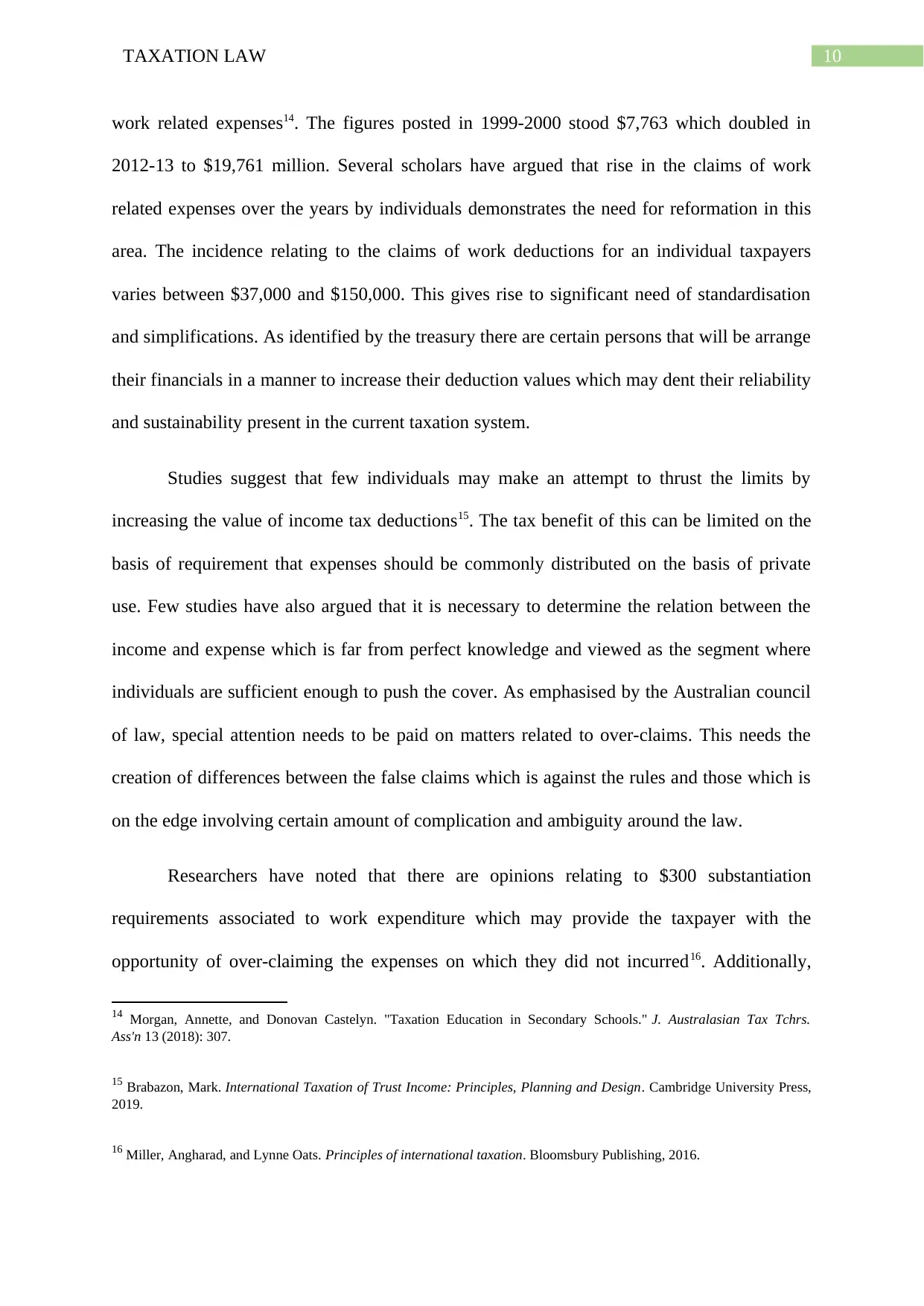
10TAXATION LAW
work related expenses14. The figures posted in 1999-2000 stood $7,763 which doubled in
2012-13 to $19,761 million. Several scholars have argued that rise in the claims of work
related expenses over the years by individuals demonstrates the need for reformation in this
area. The incidence relating to the claims of work deductions for an individual taxpayers
varies between $37,000 and $150,000. This gives rise to significant need of standardisation
and simplifications. As identified by the treasury there are certain persons that will be arrange
their financials in a manner to increase their deduction values which may dent their reliability
and sustainability present in the current taxation system.
Studies suggest that few individuals may make an attempt to thrust the limits by
increasing the value of income tax deductions15. The tax benefit of this can be limited on the
basis of requirement that expenses should be commonly distributed on the basis of private
use. Few studies have also argued that it is necessary to determine the relation between the
income and expense which is far from perfect knowledge and viewed as the segment where
individuals are sufficient enough to push the cover. As emphasised by the Australian council
of law, special attention needs to be paid on matters related to over-claims. This needs the
creation of differences between the false claims which is against the rules and those which is
on the edge involving certain amount of complication and ambiguity around the law.
Researchers have noted that there are opinions relating to $300 substantiation
requirements associated to work expenditure which may provide the taxpayer with the
opportunity of over-claiming the expenses on which they did not incurred16. Additionally,
14 Morgan, Annette, and Donovan Castelyn. "Taxation Education in Secondary Schools." J. Australasian Tax Tchrs.
Ass'n 13 (2018): 307.
15 Brabazon, Mark. International Taxation of Trust Income: Principles, Planning and Design. Cambridge University Press,
2019.
16 Miller, Angharad, and Lynne Oats. Principles of international taxation. Bloomsbury Publishing, 2016.
work related expenses14. The figures posted in 1999-2000 stood $7,763 which doubled in
2012-13 to $19,761 million. Several scholars have argued that rise in the claims of work
related expenses over the years by individuals demonstrates the need for reformation in this
area. The incidence relating to the claims of work deductions for an individual taxpayers
varies between $37,000 and $150,000. This gives rise to significant need of standardisation
and simplifications. As identified by the treasury there are certain persons that will be arrange
their financials in a manner to increase their deduction values which may dent their reliability
and sustainability present in the current taxation system.
Studies suggest that few individuals may make an attempt to thrust the limits by
increasing the value of income tax deductions15. The tax benefit of this can be limited on the
basis of requirement that expenses should be commonly distributed on the basis of private
use. Few studies have also argued that it is necessary to determine the relation between the
income and expense which is far from perfect knowledge and viewed as the segment where
individuals are sufficient enough to push the cover. As emphasised by the Australian council
of law, special attention needs to be paid on matters related to over-claims. This needs the
creation of differences between the false claims which is against the rules and those which is
on the edge involving certain amount of complication and ambiguity around the law.
Researchers have noted that there are opinions relating to $300 substantiation
requirements associated to work expenditure which may provide the taxpayer with the
opportunity of over-claiming the expenses on which they did not incurred16. Additionally,
14 Morgan, Annette, and Donovan Castelyn. "Taxation Education in Secondary Schools." J. Australasian Tax Tchrs.
Ass'n 13 (2018): 307.
15 Brabazon, Mark. International Taxation of Trust Income: Principles, Planning and Design. Cambridge University Press,
2019.
16 Miller, Angharad, and Lynne Oats. Principles of international taxation. Bloomsbury Publishing, 2016.
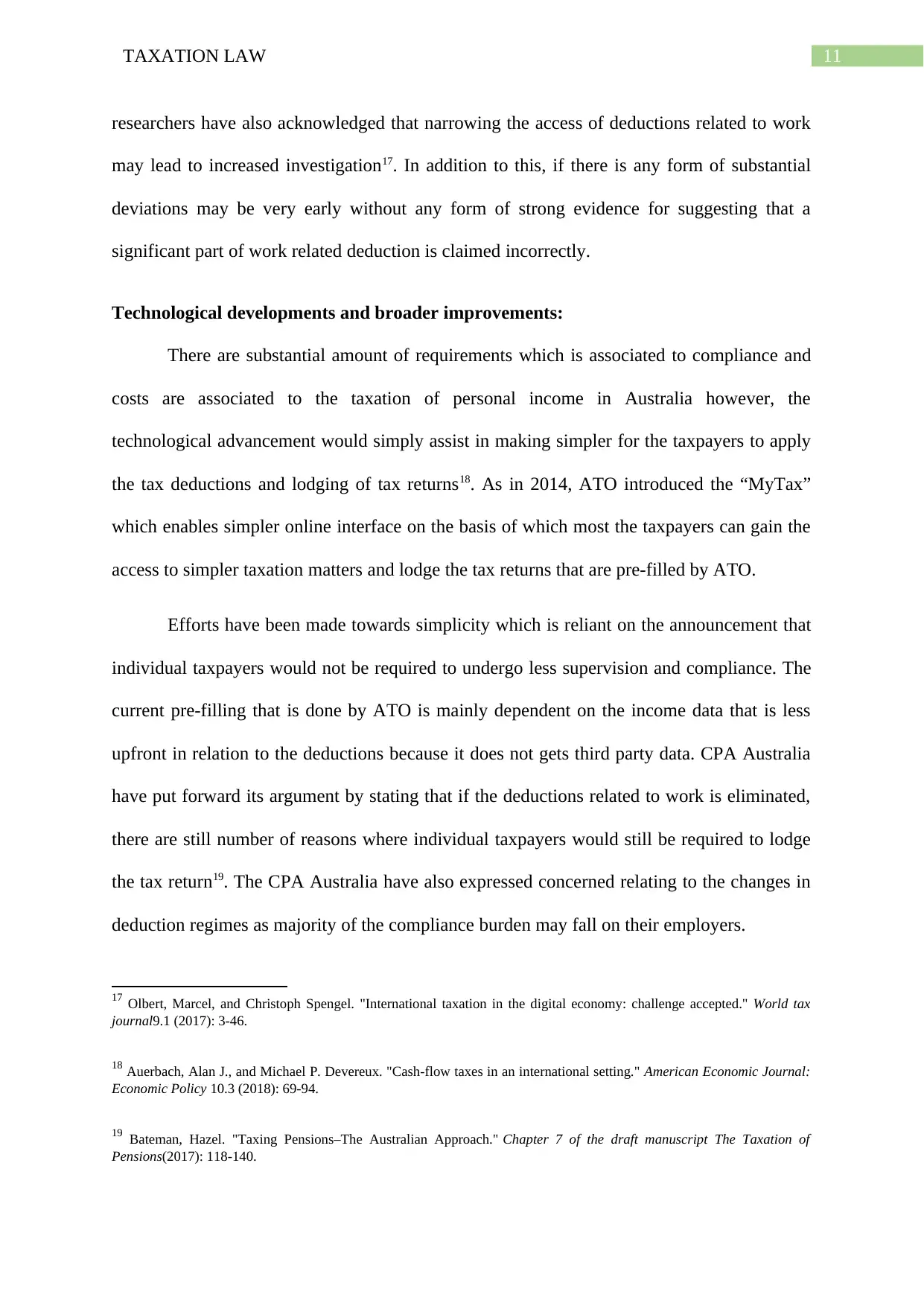
11TAXATION LAW
researchers have also acknowledged that narrowing the access of deductions related to work
may lead to increased investigation17. In addition to this, if there is any form of substantial
deviations may be very early without any form of strong evidence for suggesting that a
significant part of work related deduction is claimed incorrectly.
Technological developments and broader improvements:
There are substantial amount of requirements which is associated to compliance and
costs are associated to the taxation of personal income in Australia however, the
technological advancement would simply assist in making simpler for the taxpayers to apply
the tax deductions and lodging of tax returns18. As in 2014, ATO introduced the “MyTax”
which enables simpler online interface on the basis of which most the taxpayers can gain the
access to simpler taxation matters and lodge the tax returns that are pre-filled by ATO.
Efforts have been made towards simplicity which is reliant on the announcement that
individual taxpayers would not be required to undergo less supervision and compliance. The
current pre-filling that is done by ATO is mainly dependent on the income data that is less
upfront in relation to the deductions because it does not gets third party data. CPA Australia
have put forward its argument by stating that if the deductions related to work is eliminated,
there are still number of reasons where individual taxpayers would still be required to lodge
the tax return19. The CPA Australia have also expressed concerned relating to the changes in
deduction regimes as majority of the compliance burden may fall on their employers.
17 Olbert, Marcel, and Christoph Spengel. "International taxation in the digital economy: challenge accepted." World tax
journal9.1 (2017): 3-46.
18 Auerbach, Alan J., and Michael P. Devereux. "Cash-flow taxes in an international setting." American Economic Journal:
Economic Policy 10.3 (2018): 69-94.
19 Bateman, Hazel. "Taxing Pensions–The Australian Approach." Chapter 7 of the draft manuscript The Taxation of
Pensions(2017): 118-140.
researchers have also acknowledged that narrowing the access of deductions related to work
may lead to increased investigation17. In addition to this, if there is any form of substantial
deviations may be very early without any form of strong evidence for suggesting that a
significant part of work related deduction is claimed incorrectly.
Technological developments and broader improvements:
There are substantial amount of requirements which is associated to compliance and
costs are associated to the taxation of personal income in Australia however, the
technological advancement would simply assist in making simpler for the taxpayers to apply
the tax deductions and lodging of tax returns18. As in 2014, ATO introduced the “MyTax”
which enables simpler online interface on the basis of which most the taxpayers can gain the
access to simpler taxation matters and lodge the tax returns that are pre-filled by ATO.
Efforts have been made towards simplicity which is reliant on the announcement that
individual taxpayers would not be required to undergo less supervision and compliance. The
current pre-filling that is done by ATO is mainly dependent on the income data that is less
upfront in relation to the deductions because it does not gets third party data. CPA Australia
have put forward its argument by stating that if the deductions related to work is eliminated,
there are still number of reasons where individual taxpayers would still be required to lodge
the tax return19. The CPA Australia have also expressed concerned relating to the changes in
deduction regimes as majority of the compliance burden may fall on their employers.
17 Olbert, Marcel, and Christoph Spengel. "International taxation in the digital economy: challenge accepted." World tax
journal9.1 (2017): 3-46.
18 Auerbach, Alan J., and Michael P. Devereux. "Cash-flow taxes in an international setting." American Economic Journal:
Economic Policy 10.3 (2018): 69-94.
19 Bateman, Hazel. "Taxing Pensions–The Australian Approach." Chapter 7 of the draft manuscript The Taxation of
Pensions(2017): 118-140.
⊘ This is a preview!⊘
Do you want full access?
Subscribe today to unlock all pages.

Trusted by 1+ million students worldwide
1 out of 22
Related Documents
Your All-in-One AI-Powered Toolkit for Academic Success.
+13062052269
info@desklib.com
Available 24*7 on WhatsApp / Email
![[object Object]](/_next/static/media/star-bottom.7253800d.svg)
Unlock your academic potential
Copyright © 2020–2026 A2Z Services. All Rights Reserved. Developed and managed by ZUCOL.





